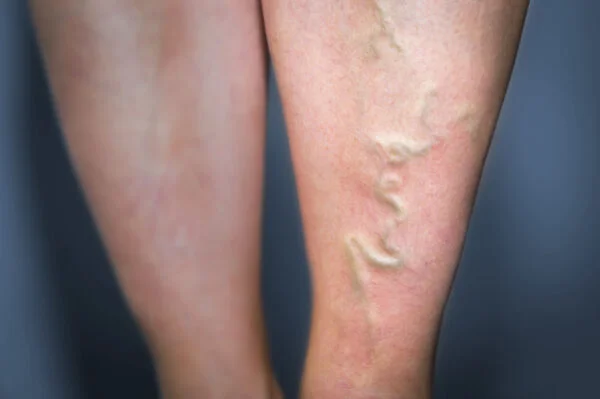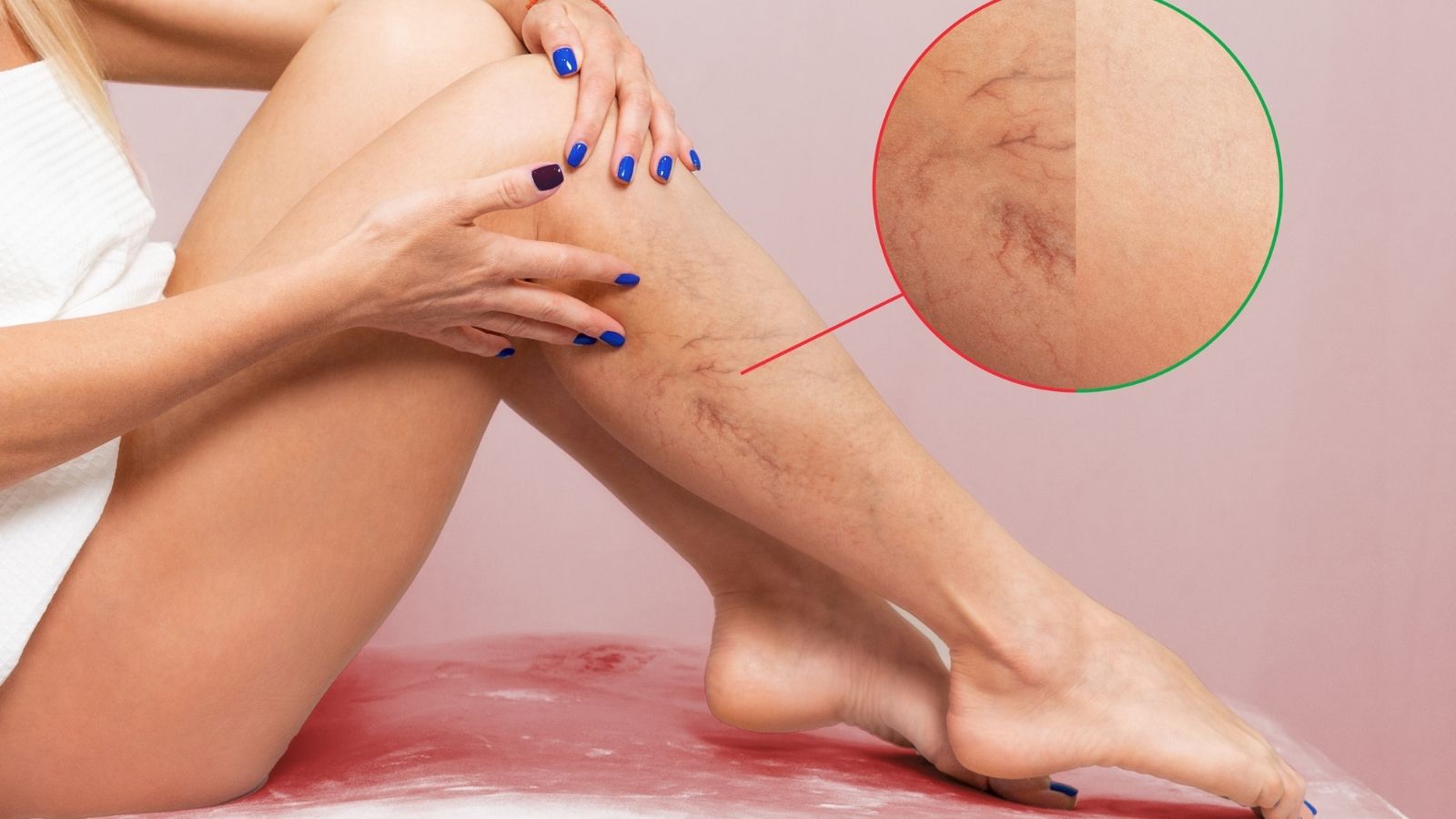A successful varicose vein treatment depends on two critical phases. The most important step before treatment is to complete a detailed Doppler ultrasound mapping to clearly identify the source of the problem. The first rule after treatment is to start walking (mobilization) immediately to minimize the risk of deep vein thrombosis. The speed and comfort of your recovery are directly linked to the accuracy of this mapping and to how closely you follow your doctor’s post-procedure activity and (if needed) compression recommendations.
What is the first step toward a successful varicose vein treatment?
Everything begins with a thorough clinical examination and assessment. At this stage, internationally accepted standardized scoring systems are used to objectively determine the severity of your leg symptoms. These scores not only clarify your current status, they also serve as critical benchmarks to track improvement after treatment.
Why is Doppler Ultrasound so important in diagnosing varicose veins?
The indispensable step after the clinical exam is Color Doppler Ultrasound (DUS). Doppler ultrasound is the “roadmap” of varicose vein treatment. It is the only method that shows that the visible varices are merely an outcome, while the real problem lies in valve failure—i.e., “reflux” (backflow)—of the main superficial veins (typically the saphenous veins) beneath the skin. Proceeding without this map is like searching for a target in the dark.
During the scan you may be asked to perform a Valsalva maneuver (bear down) or your leg may be gently compressed and released. These maneuvers help clearly reveal the presence and duration of reflux within the vein.
This mapping not only confirms the diagnosis; it also determines which treatment to choose. For example, anatomical proximity of the target vein to a nerve or to the skin is identified with this detailed mapping, allowing the safest plan to be drawn. The most common cause of failed treatment or early recurrence is an inadequately performed ultrasound mapping.
What are the modern treatment methods for varicose veins?
Over the last two decades, treatment has undergone a revolution—from large surgical incisions to needle-puncture, minimally invasive techniques.
Is the ‘classic surgery’ (vein stripping) still necessary in varicose vein treatment?
Traditional surgery once known as “stripping” (removing the vein) or “high ligation” (tying the vein in the groin) has now been almost entirely abandoned. International medical guidelines view this operation as a last resort. The current standard for symptomatic axial reflux is to use endovenous ablation (intravascular) methods instead of surgery. Surgery is considered only in rare situations where modern techniques cannot be applied (e.g., lack of technology or extremely tortuous anatomy).
How do modern varicose vein treatments (ablation) work?
These modern tools—your specialist’s “toolbox”—fall into two main groups. Rather than “pulling the vein out,” they close it from the inside (ablation), allowing the body to resorb it over time.
Contemporary treatments are divided into two main categories: those that deliver heat (thermal) and those that use chemical/mechanical mechanisms (non-thermal) to close the vein from within.
The modern methods are:
- Endovenous Laser Ablation (EVLA)
- Radiofrequency Ablation (RFA)
- Medical Adhesive (Cyanoacrylate / VenaSeal)
- Ultrasound-Guided Foam Sclerotherapy (UGFS)
- Mechanochemical Ablation (MOCA)
In these methods, the core principle is to access the vein via a needle under ultrasound guidance and to close the main culprit vein from the inside. Laser (EVLA) and Radiofrequency (RFA) do this by delivering controlled thermal energy. Medical Adhesive (CAC/VenaSeal) glues the vein walls together to stop blood flow. Foam Sclerotherapy (UGFS) delivers a specialized drug in foam form to chemically close the vein and is often preferred for more tortuous tributaries.
Choice of Varicose Vein Treatment
While all modern methods have high success rates, their differences directly impact procedural comfort and recovery time.
Which of these treatment methods is ‘the best’?
According to scientific guidelines, Laser, Radiofrequency, Medical Adhesive, and Foam all carry a “Strong Recommendation” for treating axial reflux in main superficial veins. This means each has proven high efficacy.
Clinical decision-making has shifted from “Which method is best?” to “Which tool best fits this patient’s specific anatomy (vein diameter, depth, tortuosity) and preferences?”. Evidence shows these methods are equivalent in vein closure and quality-of-life improvement. The key differences lie in comfort during/after the procedure, pain levels, and recovery speed.
Why is ‘tumescent anesthesia’ required in heat-based (Laser/RFA) treatments?
Thermal methods (Laser and Radiofrequency) require “tumescent anesthesia”—a special fluid injected in multiple passes under ultrasound—so that surrounding tissues and nerves are shielded from heat while the vein is closed.
This fluid has three main functions:
- Provide complete local anesthesia, making the procedure painless.
- Create a “thermal shield” around the vein to protect the skin and nerves.
- Compress the vein externally so the laser/RF catheter maintains full contact with the vein wall.
Although highly effective, some of the post-procedure pain, bruising, and transient nerve-irritation (numbness) risk is related to these multiple injections.
What is different about treating varicose veins with medical adhesive (VenaSeal)?
The hallmark of non-thermal/non-tumescent (NTNT) techniques—especially medical adhesive (CAC/VenaSeal)—is that they do not require tumescent anesthesia. The procedure is completed with a single local injection at the catheter entry site (typically below the knee).
Direct advantages for the patient include:
- No multiple needle injections
- Minimal pain during and after the procedure
- Near-zero risk of heat-related nerve injury (no heat is used)
- Very little bruising
- No mandatory compression stockings afterward
- Shorter procedure time
Disadvantages include:
- May be less effective in very large-diameter veins
- Can cause superficial phlebitis and pain in very superficial veins
For these reasons, medical adhesive is an attractive alternative particularly where nerve-injury risk is higher (e.g., in the calf) or when patients have needle aversion.
What is done for the visible, tortuous varicose veins?
The goal is a comprehensive solution. It is not sufficient to close only the underlying axial reflux (GSV/SSV). The visibly bulging, tortuous tributaries that cause the main cosmetic concern and symptoms must also be addressed.
Adjunctive options for these visible veins include:
- Miniphlebectomy (removing veins through tiny micro-incisions with special hooks)
- Foam Sclerotherapy (UGFS) (injecting foam into the visible tributaries)
Do I need to be fasting on the day of the procedure?
This depends entirely on the type of anesthesia. The vast majority of modern endovenous procedures such as Laser, Radiofrequency, or Medical Adhesive are performed under local and/or tumescent anesthesia (i.e., while you are awake). Fasting (NPO) is not required for these. You may have a normal breakfast or a light lunch. If IV sedation is planned for you, then typical fasting is 6 hours for solids and 2 hours for clear liquids.
Should I stop my blood thinner (e.g., Aspirin) before treatment?
This is critical. Although older protocols advised stopping such drugs to reduce bruising, current European vascular guidelines (ESVS 2022) recommend the opposite: do not stop anticoagulant/antiplatelet medications.
Why? Modern endovenous procedures carry a very low bleeding risk. The systemic thrombotic risk of stopping these drugs (heart attack, stroke, or DVT) outweighs the local, expected bruising. Modern procedures can be safely performed while continuing these medications (accepting the higher bruising risk).
What should I bring on the day of the procedure?
Being prepared makes the day smoother.
- If a thermal method (Laser/RFA) or foam is planned, your prescribed compression stockings
- Comfortable, dark, high-waist undergarments that won’t be stained by iodine solutions
- Do not shave your legs on the morning of the procedure—this reduces skin irritation from sterilizing solutions and infection risk from razor nicks.
Post-Procedure Period
- Once the procedure ends, recovery begins. Two key elements drive this phase: compression and mobilization (movement).
What is the single most important thing to do immediately after treatment?
Walk. Strict bed rest is contraindicated. Immediately after any modern treatment (laser, adhesive, etc.), you will be instructed to begin walking to reduce the risk of Deep Vein Thrombosis (DVT) and to enhance venous flow. Walking activates the calf muscle pump, accelerating venous return and preventing clot formation. Patients should be prescribed at least 30–60 minutes of walking per day—including the day of the procedure—split into short bouts of 10–20 minutes.
How long should I wear compression stockings?
This depends on the method. Current guidelines “recommend” at least 1 week of compression after thermal ablation (Laser/RFA) primarily to reduce pain and improve comfort. The key point: modern guidelines suggest stockings not primarily to “prevent DVT” or “improve success,” but chiefly to reduce post-procedure discomfort.
Which activities are restricted after treatment?
Most patients can return to normal daily routines or desk work the next day. However, some strenuous activities should be avoided for the first few weeks:
- Heavy lifting (typically over 5–10 kg)
- Intense running or cycling
- High-impact aerobics or heavy leg-loading strength exercises
- Prolonged immobility (sitting or standing)—if unavoidable, take frequent walking breaks
- Baths, pools, hot tubs (to reduce infection risk during the first week; showers are fine)
Recovery and Recognizing Complications
- Proper patient education is the key to reducing unnecessary anxiety and detecting true complications early.
What symptoms are considered ‘normal’ after treatment?
Certain findings are expected during recovery and do not indicate a problem:
- Mild-to-moderate pain, tenderness, and tightness along the treated vein
- Bruising at treatment sites (especially after thermal methods and miniphlebectomy)
- If miniphlebectomy was performed, small tender, firm nodules under the skin (trapped, clotted blood)
- After medical adhesive (VenaSeal), mild itching, redness, or inflammation along the treated area (a transient reaction that indicates the therapy is working)
What is the firm ‘cord’ I feel in my leg after treatment?
This is a very common question. Within 1–4 weeks after treatment (thermal or adhesive), you may feel a firm, taut, cord-like structure where the vein was treated.
This is not a dangerous clot (DVT). On the contrary, it is a sign of successful therapy. Your body is transforming the closed vein into a natural healing tissue (fibrosis). This firmness is part of normal recovery and will soften and resolve over time (over months).
Which ‘red flag’ signs should prompt me to call my doctor?
The following are outside the normal recovery spectrum and warrant urgent medical evaluation:
- Sudden, worsening, asymmetric (one-sided) leg swelling that differs from typical post-procedure edema (may suggest DVT)
- Increasing, spreading, or intensifying redness and warmth at the treatment site (possible cellulitis/infection)
- Fever or chills
- Purulent (pus-like) discharge from the treatment site
- Sudden shortness of breath or chest pain (possible Pulmonary Embolism — PE)
- Severe burning along the treated track or new motor weakness in the foot (possible nerve injury)
Distinguishing normal swelling from dangerous DVT-related swelling is crucial. Mild post-procedure edema is common and improves with compression/elevation. DVT swelling usually starts abruptly, is more severe, asymmetrical, and does not resolve simply with rest. When in doubt, contact your physician.
Long-Term Follow-Up and the Road Ahead
- Management of venous disease continues even after the procedure.
Is varicose vein treatment a permanent cure, or can my varices recur?
The honest answer: Chronic Venous Disease is progressive and chronic. Modern treatments are highly effective at fixing the current pathologic vein segment, but they do not “cure” your predisposition or genetic tendency.
Recurrence can occur. Main reasons include:
- Development of new, pathologic (refluxing) veins in the treated area (neovascularization)
- New reflux developing over time in previously healthy veins (disease progression)
- Very rarely, reopening (recanalization) of a successfully closed vein
- Therefore, annual clinical and DUS follow-up is recommended to detect and manage recurrence early.
How do modern treatments compare with older surgeries in terms of success?
This is one of the strongest scientific arguments for the endovenous revolution. A 2023 analysis compared recurrence rates at 5 years. The results are clear:
- Traditional Surgery (Stripping): 34.4%
- Endovenous Laser Ablation (EVLA): 16.6%
- Radiofrequency Ablation (RFA): 6.7%
These data show that endovenous methods are not only less invasive (more comfortable) but also provide much more durable medium-term outcomes.
What can I do to reduce the risk of recurrence?
Because underlying risk factors (genetics, obesity, sedentary lifestyle) are not eliminated by ablation, the only way to lower recurrence risk is lifelong risk-factor management:
- Regular physical activity (especially walking and exercises that activate the calf pump)
- Weight control (maintaining a healthy weight—obesity is a major risk factor)
- Avoid prolonged standing or sitting
- Use preventative compression stockings in situations requiring long standing/sitting (e.g., long flights/bus trips, standing occupations)
- Elevate the legs whenever possible

Op. Dr. İlker Zan is a cardiovascular surgeon who has been specialized for many years in vascular diseases and phlebology (varicose and venous disorders). Between 1995 and 2001, he studied at the Gaziantep University Faculty of Medicine and subsequently completed his cardiovascular surgery residency at the Dicle University Faculty of Medicine Hospital. Since 2011, by performing minimally invasive (endovenous) varicose vein treatments, he has become one of the pioneering names in this field in Türkiye.
In 2019, with the establishment of the Dr. Zan Varis Clinic in Alanya, Dr. Zan introduced modern phlebology practices to the region and, as of 2025, he continues to provide services at his new clinic in Antalya. At his clinic, he offers individualized diagnostic and treatment plans for each patient and provides solutions with endovenous laser treatment (EVLT), radiofrequency (RF) ablation, foam treatment, sclerotherapy, CLACS, and echo-guided sclerotherapy—minimally invasive methods that allow painless, scar-free treatment and rapid recovery.
Dr. Zan approaches varicose veins not merely as a cosmetic issue, but as a serious vascular health problem. With a scientific, ethical, and patient-centered approach, he aims to improve his patients’ quality of life and, as a member of the National Society of Vascular Surgery and the European Society for Vascular Surgery (ESVS), he provides treatment in line with international standards.



